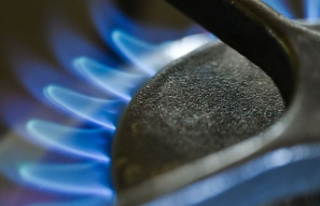The FDP parliamentary group calls on Chancellor Olaf Scholz (SPD) to take care of the procurement of liquid gas. "The fact that Minister of Economics Habeck's deal now seems to have burst is a major setback," said deputy parliamentary group leader Carina Konrad of the German Press Agency in Berlin. It needs a new start at the highest level. "Chancellor Scholz should now personally and at the highest level campaign for LNG deliveries from the Middle East, because the uncertainty of the population and industry is continuing to grow due to the impending worsening of the gas shortage."
Economics Minister Robert Habeck (Greens) said in a public appearance last week that Qatar had not made a good offer. The German companies with whom he visited the emirate in March decided to buy gas elsewhere.
The FDP politician Konrad said that the coalition's primary goal was an affordable energy supply throughout the winter. Alternatives to the disappearing and increasingly unsafe gas supplies from Russia are needed. "Treats with Qatar are certainly not our first choice, but given the current situation, it would be difficult to do without them."
Konrad reminded that gas was intended as a bridging technology for the next few years until the share of renewable energies continued to grow. "This bridge is breaking away from us right now." It remains important to fill the gas storage tanks. Therefore, the continued operation of the remaining nuclear power plants is logical and sensible. Germany actually wants to phase out nuclear power completely by the end of the year; three reactors are currently still in operation. "In order not to lose any more time, the Ministry of the Environment must urgently prepare an amendment to the Atomic Energy Act, which can also be initiated by the Bundestag before September," demanded Konrad.
Federal Development Minister Svenja Schulze (SPD) also warned against too much euphoria after the first transport ships left Ukrainian ports with grain on board. "Grain prices have fallen slightly, but are still at a high level," said Schulze of the Düsseldorf "Rheinische Post" and the Bonn "General-Anzeiger" (Tuesday editions). Russian President Vladimir Putin has "broke his word too many times for us to trust him".
"Unfortunately, this is no reason for euphoria," the minister continued. "We can never be sure that he won't continue to use grain as a weapon." At the same time, Schulze emphasized that every ton of grain that is exported can help people who are suffering from high food prices.
The SPD politician advocated reducing one-sided dependencies in the global food system. That is why developing countries must be helped "to grow food in their own country in a sustainable and climate-adapted manner". She is committed to this in the Alliance for Global Food Security.
For the time being, Russia does not want to tolerate contractually agreed inspections of its nuclear arsenal by US inspectors again. Western sanctions are hampering inspections by Russian inspectors on US territory, the State Department in Moscow said on Monday. It pointed to punitive measures against Russian flights, visa restrictions and other hurdles that prevented Russian military experts from traveling to American nuclear weapons facilities. This would give the US “unilateral advantages” if inspections on Russian territory continued. Because American inspectors would not have such problems.
The controls are laid down in the New Start Agreement, the last remaining nuclear disarmament treaty between the two countries. The pact was signed in 2010 by then-US President Barack Obama and then-Russian President Dmitry Medvedev. New Start imposes a limit of 1,550 total nuclear warheads on each country. Both sides are allowed 700 active carrier systems, i.e. ICBMs and bombers. The contract provides for comprehensive mutual on-site inspections to check compliance.
Moscow's move comes at a time of massive tensions over Russia's war of aggression against Ukraine. It is the first time that the Kremlin has put the inspections by US experts agreed in the disarmament pact on hold. President Joe Biden's government initially did not comment on the Russian decision.
"Kick-off Politics" is WELT's daily news podcast. The most important topic analyzed by WELT editors and the dates of the day. Subscribe to the podcast on Spotify, Apple Podcasts, Amazon Music, among others, or directly via RSS feed.












